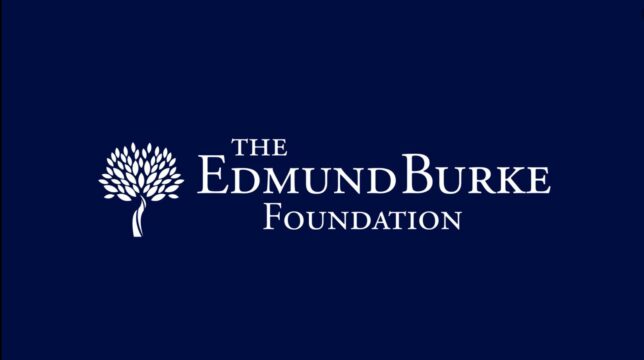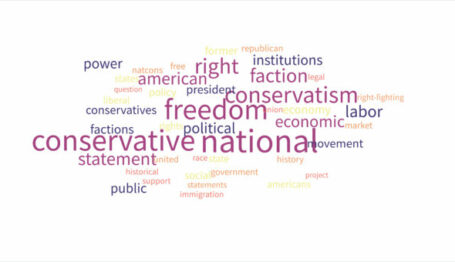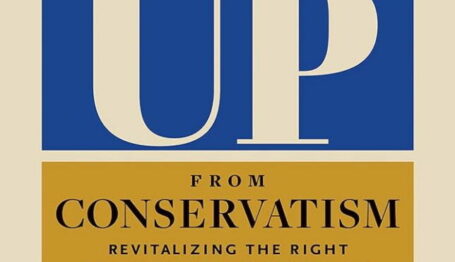Special Report
On the Question of Right Fights: Dueling Manifestos


On the Question of Right Fights (full series)
Factions on the Right | Dueling Manifestos
National Conservatism at Arms | Postliberals for American Liberalism
“Grill Dad Republican”
Dueling Manifestos: NatCons and FreeCons
In 2022, a working group commissioned by the Edmund Burke Foundation, the organization behind the periodic National Conservatism Conferences, published “National Conservatism: A Statement of Principles.” The statement amounts to a manifesto for self-described National Conservatives. It affirms 10 points, which I summarize here:
- National Independence: an affirmation of the principle of national sovereignty.
- Rejection of Imperialism and Globalism: a rejection of military aggression against neighboring states and the cession of sovereign power to transnational institutions like the United Nations or European Union.
- National Government: an affirmation of the power of democratic legislatures against courts and administrative government.
- God and Public Religion: an affirmation of the primacy of Biblical morality in public life.
- The Rule of Law: an affirmation of the primacy of law over public disorder.
- Free Enterprise: an affirmation of private property rights within the context of the national interest.
- Public Research: a call for government-funded military research and development to counter the People’s Republic of China.
- Family and Children: a call to focus policymaking and social conduct on affirming the natural “nuclear” family.
- Immigration: a call for “much more restrictive [immigration] policies until [Western] countries summon the wit to establish more balanced, productive, and assimilationist policies.”
- Race: an acknowledgment that the “nationalism we espouse respects, and indeed combines, the unique needs of particular minority communities and the common good of the nation as a whole.”
Left-wingers, predictably, denounced the statement as thinly coded Hitlerism. The Washington Post’s David von Drehle wrote that it “sounds a lot like fascism.” Salon.com called it “a road map for autocracy.” From the other side of the spectrum, the European Conservative published a criticism of the statement from mostly British and American religious-minded thinkers who condemned the statement for excessive deference to Anglo-American market economics and insufficient commitment to national and international friendship and charity.
But the document’s sectarianism—its God and Public Religion principle explicitly states, “Where a Christian majority exists, public life should be rooted in Christianity and its moral vision, which should be honored by the state and other institutions both public and private”—and its extensive caveats to its professed preference for the market economy led to broader right-of-center opposition. Jack Butler, a National Review writer, criticized the statement and the movement that upholds it for focusing too much on the distribution of Beltway patronage than restoring the American constitutional order.
Critics like Butler would soon have their own manifesto. In 2023, a group led by Foundation for Research on Equal Opportunity president Avik Roy and John William Pope Foundation president John Hood released “Freedom Conservatism: A Statement of Principles.” Claiming intellectual inspiration from the 1960 Sharon Statement, a declaration of the values of what was then called Young Americans for Freedom, the Freedom Conservatism statement also declared 10 principles, which I summarize here:
- Liberty: an affirmation that “Among Americans’ most fundamental rights is the right to be free from the restrictions of arbitrary force.”
- The pursuit of happiness: an affirmation of the family, community, and parental rights.
- The foundation of prosperity: an affirmation of the market economy and a commitment to using it to reduce the cost of living.
- Full faith and credit: a declaration that the national debt is an “existential threat” to the United States and a commitment to restoring fiscal sustainability.
- A nation of laws, not men: a condemnation of unaccountable regulatory power.
- Americans by Cchoice: an affirmation that anyone can seek to become an American and that the U.S. “has the right to secure its borders and design a rational immigration policy.”
- Out of many, one: an affirmation of federalism and localism under the Constitution.
- America’s promissory note: an acknowledgment of the country’s historical failures to extend the full liberties of citizenship to Black Americans and a condemnation of “racial discrimination in all its forms.”
- The shining city on a Hill: an affirmation of American geopolitical primacy.
- Freedom of conscience: a defense of free speech and religious nonsectarianism in government.
Reading the two statements at a surface level, the disputes between the factions are hard to see. National Conservatism statement signer and National Review writer Michael Brendan Dougherty argued as much, writing, “I’m struck by how easily harmonized the NatCon and FreeCon statements are. In fact, there is just a lot of plain overlap.”
But conflict there is, much of it below the level of the statements. In a National Review reply to Dougherty, Roy condemned the National Conservative faction for, in Roy’s words, claiming “that, unless you are willing to abridge individual and economic freedom to fight the woke Left, you ‘don’t know what time it is’” and for striving “to ‘emulate the Left’ in ‘wielding the levers of state power’ to ‘reward friends and punish enemies.’” Roy further condemned various NatCons’ anti-legal-immigration statements. Ultimately, Roy concluded that his faction and the NatCons have “differing assessments of the character of America”: FreeCons believe it will rise to challenges, while NatCons proclaim it dead. In an interview, Roy went so far as to accuse NatCons of seeking to make America “a white ethnostate,” a statement he later clarified did not apply to “all signatories of the NatCon statement.”
Yoram Hazony, the Israeli political philosopher who chairs the Edmund Burke Foundation, replied with attacks on Roy, whom he denounced as a “lowlife” for the “white ethnostate” claims. Right-fighting can get personal, very quickly.
As a substantive matter, Roy’s allegations are overheated and unfair. To use the crudest possible form of dismissal, the National Conservatism statement signers include a number of Jews (including Hazony) and non-white conservative activists, perhaps most prominently Carol Swain, the conservative academic allegedly plagiarized by ousted former Harvard University president Claudine Gay. But the National Conservatism movement’s focus on demographics and radical positioning on immigration—an outright moratorium—will invite criticism on these grounds, not all of which will be professed as intemperately as Roy’s.
In the next installment, the New Right struggles to be normal.



